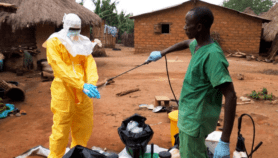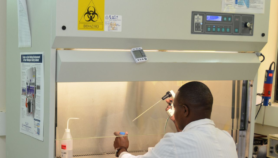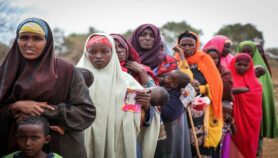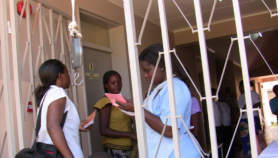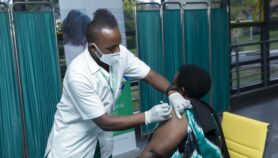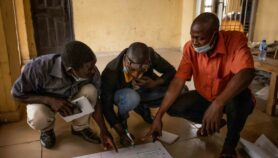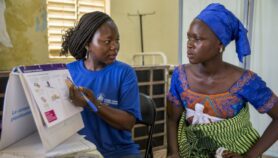07/05/20
Q&A: COVID-19 is fuelling innovation, R&D in Africa
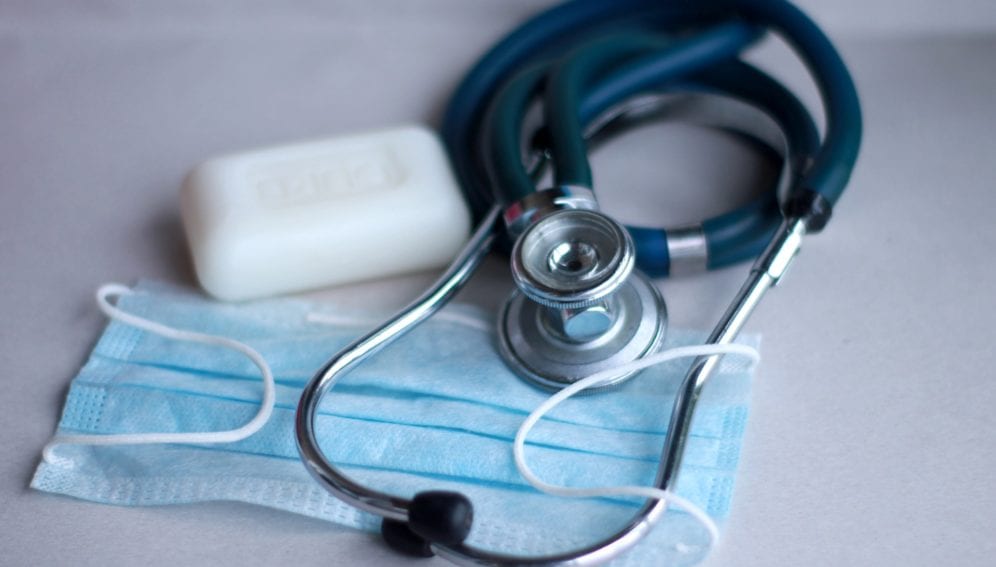
By: Eldon Opiyo
Send to a friend
The details you provide on this page will not be used to send unsolicited email, and will not be sold to a 3rd party. See privacy policy.
There is no doubt that the COVID-19 pandemic is taking a heavy toll on the Sustainable Development Goals (SDGs), particularly those related to health.
However, Matshidiso Moeti, director of the WHO’s African Region, sees a silver lining in terms of research and development (R&D), innovation and international collaboration in Africa as a result of the outbreak.
In this pandemic, the pace of R&D and international collaboration is unlike anything we have seen previously in Africa, Moeti told SciDev.Net in an exclusive interview this week (05 May).
So far, Africa has fewer COVID-19 cases than many other regions of the world. Why is this so?
The virus reached other parts of the world before Africa, and since its arrival on the continent on 14 February, many African countries quickly implemented lockdowns and physical distancing measures and this has slowed the spread of the virus.
“If cases continue to increase rapidly in African countries, health systems will not be able to cope.”
Matshidiso Rebecca Natalie Moeti, WHO Regional Office for Africa
One of the biggest challenges we face in Africa is the acute shortage of test kits. The first step in fighting COVID-19 is knowing where the virus is circulating, and this is why testing is so important.
However, in the African region, on average nine tests are being conducted per 10,000 people. This is much lower than that of countries such as Italy where more than 200 tests per 10,000 people have been conducted. We are working with governments, development partners, scientists and the private sector to scale-up availability and equitable access, and this is an urgent priority.
The median age of Africa’s 1.2 billion people is 19.7 years. How is this playing out in the pandemic?
With the preliminary data we have, we are observing more severe illness in older people similar to other parts of the world. However, so far, the average age among those who have lost their lives is 52 years, which is younger than in other parts of the world.
Globally, we are seeing that up to 10–15 per cent of people under 50 who have COVID-19 will have moderate to severe infection. Therefore, it’s important that people of all ages follow the public health measures of hand hygiene, physical distancing, respiratory etiquette and disinfecting surfaces to protect themselves and their communities.
Malnutrition, anaemia, malaria, HIV/AIDS and tuberculosis are prevalent in Africa. Will these complicate COVID-19 control?
There are two considerations. First, this is a new disease in which people with underlying conditions suffer more severe illness with COVID-19. We need to analyse transmission patterns to understand the severity among people with HIV/AIDS, TB, malaria and other diseases. South Africa, for instance, is actively tracking the HIV-positive population to identify how COVID-19 could impact HIV.
The second consideration is ensuring that health systems are not overwhelmed by COVID-19 and that routine services continue to be provided, including treatment for chronic diseases, safe deliveries for mothers, and immunisation for children. For example, a recent analysis found that if insecticide-treated bed net distribution stops and case management reduces, malaria deaths in Sub-Saharan Africa could double in comparison to 2018.
Thus, we are working with countries and partners to continue providing essential services, while at the same time protecting health workers and communities from COVID-19.
Social cohesion and social gatherings are of great importance in Africa. How could these cultural factors influence physical distancing in combating COVID-19?
Social cohesion in Africa is potentially a great advantage that we can use to mobilise communities to stop the spread of this virus and we are working with community leaders, civil society groups and others such as the UNICEF and the Red Cross to strengthen grassroots action.
Several religious leaders have advised their congregations to pray at home and families are adjusting, as in other countries, by speaking on the phone rather than visiting. Communities can also help with surveillance, contact tracing and sharing accurate information on this disease in addition to adhering to preventive measures such as physical distancing.
“We are now working with those innovators and partners to put into action the most promising innovations. ”
Matshidiso Rebecca Natalie Moeti, WHO Regional Office for Africa
Using Google’s Mobility Reports, we have looked at how people are moving around and we see significant drops since February in the number of people visiting restaurants, markets and transport hubs, an indication some population groups are practising physical distancing.
How is the COVID-19 pandemic hurting Africa’s efforts to realise the Sustainable Development Goals (SDGs), particularly those relating to health?
This pandemic is having huge social and economic impacts, and it is a threat to the region’s achievement of the SDGs. Children are out of school and many adults are out of work, communities are facing food insecurity and we recognise the need not only to save lives but to protect livelihoods, particularly for low-income households and those working in the informal sector. Thus, progress on a number of the SDGs will potentially be impacted.
Specifically on health, we are doing our best to maintain the focus on other priority health programme such as preventing and controlling communicable and noncommunicable diseases and improving maternal and child health. It is important that gains made in these areas are not reversed.
Our daily work on fighting COVID-19 fits within a broader context of aiming to achieve universal health coverage, and this pandemic is showing that it is essential that everyone has access to quality, affordable healthcare.
Hasn’t COVID-19 badly exposed Africa’s deficient healthcare infrastructure that has largely concentrated on prevention and cure?
Only one in three Africans has access to essential health services and even among those who do have access, less than half are using the available services. We are working with countries to expand access and to improve the quality of primary healthcare services, and to ensure the services provided reflect the local disease burden and needs of different population sub-groups.
African countries have also faced many widespread and severe disease outbreaks, and many countries are going through humanitarian crises. These external shocks place even greater pressure on health systems and services.
COVID-19 has overwhelmed health systems in many countries and we know that if cases continue to increase rapidly in African countries, health systems will not be able to cope. This is why containing this virus and stopping its spread in communities is so important.
How do you think the outbreak will evolve in Africa?
We are working with partners and countries to do modelling studies and projections. What these analyses make clear is the importance of maintaining and intensifying the public health response to this pandemic.
Isn’t COVID also generating invention, innovation and policy shifts for new healthcare models in Africa?
Yes, definitely. For example, within one month of the first confirmed case in the WHO African Region, we held a virtual COVID-19 hackathon with 100 African innovators who know the regional context well, and they proposed solutions to some of the challenges we are facing in the response. We are now working with those innovators and partners to put into action the most promising innovations.
In the long term, this pandemic is highlighting the need for increased investment in emergency preparedness, and the importance of strengthening public health capacities and building more resilient health systems.
We are supporting countries in these areas and hope that partners and governments will prioritise action in these areas going forward.
Q&As are edited for brevity and clarity.
This piece was produced by SciDev.Net’s Sub-Saharan Africa English desk.


